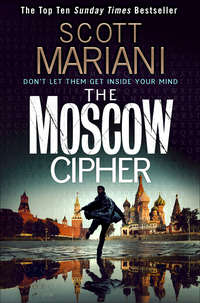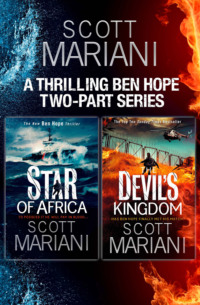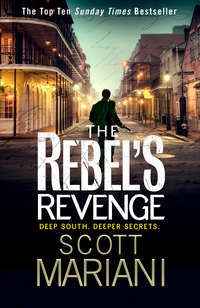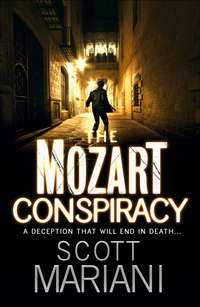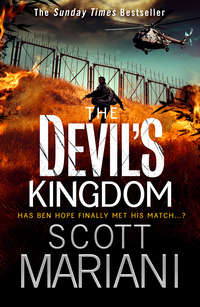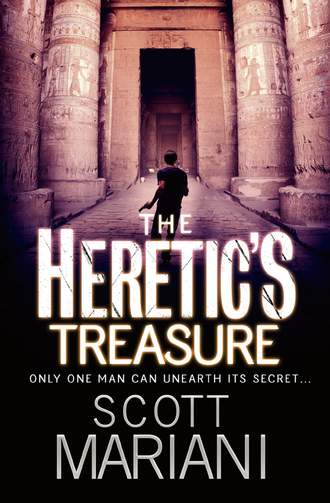
Полная версия
The Heretic’s Treasure

SCOTT MARIANI
The Heretic’s Treasure

Copyright
Published by Avon an imprint of
HarperCollinsPublishers Ltd 1 London Bridge Street London SE1 9GF
www.harpercollins.co.uk
This ebook edition published by HarperCollins Publishers 2016
First published in paperback by HarperCollinsPublishers, 2009
Copyright © Scott Mariani 2009
Cover design © Henry Steadman 2016
Scott Mariani asserts the moral right to be identified as the author of this work.
A catalogue copy of this book is available from the British Library.
This novel is entirely a work of fiction. The names, characters and incidents portrayed in it are the work of the author’s imagination. Any resemblance to actual persons, living or dead, events or localities is entirely coincidental.
All rights reserved under International and Pan-American Copyright Conventions. By payment of the required fees, you have been granted the non-exclusive, non-transferable right to access and read the text of this e-book on screen. No part of this text may be reproduced, transmitted, down-loaded, decompiled, reverse engineered, or stored in or introduced into any information storage and retrieval system, in any form or by any means, whether electronic or mechanical, now known or hereinafter invented, without the express written permission of HarperCollins.
HarperCollinsPublishers has made every reasonable effort to ensure that any picture content and written content in this ebook has been included or removed in accordance with the contractual and technological constraints in operation at the time of publication
Ebook Edition © May 2016 ISBN 9780007334575
Version: 2018-07-18
Dedication
This one is for Malu Pothi,
a very special Bengal tigress
You are in my heart and none other knows thee But your son ‘Akhenaten’. You have given him understanding of your designs and your power. The people of the world are in your hand…
From ‘Hymn to the Sun’
The Pharaoh Akhenaten
Contents
Cover
Title Page
Copyright
Dedication
Epigraph
Chapter One
Chapter Two
Chapter Three
Chapter Four
Chapter Five
Chapter Six
Chapter Seven
Chapter Eight
Chapter Nine
Chapter Ten
Chapter Eleven
Chapter Twelve
Chapter Thirteen
Chapter Fourteen
Chapter Fifteen
Chapter Sixteen
Chapter Seventeen
Chapter Eighteen
Chapter Nineteen
Chapter Twenty
Chapter Twenty-One
Chapter Twenty-Two
Chapter Twenty-Three
Chapter Twenty-Four
Chapter Twenty-Five
Chapter Twenty-Six
Chapter Twenty-Seven
Chapter Twenty-Eight
Chapter Twenty-Nine
Chapter Thirty
Chapter Thirty-One
Chapter Thirty-Two
Chapter Thirty-Three
Chapter Thirty-Four
Chapter Thirty-Five
Chapter Thirty-Six
Chapter Thirty-Seven
Chapter Thirty-Eight
Chapter Thirty-Nine
Chapter Forty
Chapter Forty-One
Chapter Forty-Two
Chapter Forty-Three
Chapter Forty-Four
Chapter Forty-Five
Chapter Forty-Six
Chapter Forty-Seven
Chapter Forty-Eight
Chapter Forty-Nine
Chapter Fifty
Chapter Fifty-One
Chapter Fifty-Two
Chapter Fifty-Three
Chapter Fifty-Four
Chapter Fifty-Five
Chapter Fifty-Six
Chapter Fifty-Seven
Chapter Fifty-Eight
Epilogue
Author’s Note
Acknowledgements
About the Author
Also by Scott Mariani
About the Publisher
Chapter One
The Western Desert, Egypt Late September 2008
Nobody knew how many centuries the desolate Bedouin fort had been standing out here among the oceans of sand, its crumbling walls abandoned long ago.
Perched up high on a ruined tower, a vulture cocked its head and peered down at the line of dusty 4x4 vehicles that passed through the gateway and pulled up in the courtyard.
The passenger door of the lead vehicle swung open. A combat boot crunched down into the sand and a man stepped out of the car, stretching his cramped muscles after the long trek westwards and shielding his eyes from the sun’s white glare. There was no wind. The air was a furnace.
The man’s name was Khaled Kamal, and he was one of Egypt’s most wanted terrorists. The man without a face, the one they could never catch.
The rest of the group climbed down from the vehicles. Eleven men, all watching their leader. Nobody spoke. They wore a mixture of military combat fatigues, T-shirts and jeans. Six of them had stubby AKS-74 assault weapons slung over their shoulders. There were a lot more guns in the vehicles, the smell of cordite still on them.
Kamal scanned the empty ruin. He scratched the three-day-old stubble on his chin and thought about the events of the last thirty-six hours.
The diversion had worked well. If the choppers had been mobilised after the attack, then the anti-terrorist forces were hunting in the wrong place. Nobody would be looking for them out here in the middle of nowhere, hundreds of miles west across the desert from the Aswan to Cairo railroad where Kamal and his gunmen had opened fire on a northbound tourist train.
He smiled to himself as he replayed the fresh images in his mind. The passengers had been sitting ducks. Six carriages ripped to shreds by automatic fire. Blood on the tracks and on the sand. Another successful job.
But, after more than a decade, Kamal was getting bored with taking potshots at Westerners. Back in 1997, when the radical Gama’a al-Islamaya group had massacred more than sixty tourists at Hatshepsut’s Temple near Luxor, Kamal had been the only one who got away from the anti-terrorist commandos. Since then he’d been involved in dozens of bus ambushes, tourist resort bombings, gun attacks on Nile river cruisers, assassinations of US business travellers. Kamal had personally packed the nails into the motorcycle suicide bomb that had caused carnage at the Khan al-Khalihi bazaar in 2005.
All small stuff. He had his sights on something bigger, much bigger. He had the talent, the will and the manpower. And, most importantly, he had links to networks all across North Africa, the Middle East and beyond. All he lacked was funding, and for the kind of plan that had been forming in his mind he knew he’d need a lot of it. A hell of a lot.
But all that was for the future. Now the dozen men needed to escape the murderous desert heat for a while. It would be cool later, but the sun was hot enough to cook a man in his boots. The ruined fort offered shade-as well as something more valuable. Kamal unscrewed the top of his canteen and poured the last drops of water into his parched throat. He tossed the empty container into his black Nissan Patrol and wiped his mouth with his sleeve.
Hani, the youngest of the crew, was gesticulating and grinning. ‘See, didn’t I tell you?’ he laughed, pointing at the round stone well in the middle of the courtyard.
Kamal shot him a look. He hadn’t stayed alive this long by trusting people, and he was about to find out whether he could trust this one.
They leaned over the edge of the well and peered down. The shaft was deep, disappearing into darkness. Kamal picked up a loose piece of stone and dropped it in the hole. He listened for the splash. Nothing.
‘You said there would be water here,’ he said. He slapped away a sandfly.
Hani said nothing, just made a face and shrugged.
Youssef joined them at the edge. His bald scalp was glistening with sweat. He wiped it and replaced the tattered green baseball cap that he always wore. ‘We should have headed for the Farafra oasis instead.’
Kamal shook his head. The oasis area was only thirty miles to the south, and its inhabitants were mostly Bedouin. It should have been a safe haven for them-but you never knew when a police informant might be watching. The train attack would have been on radio and TV by now, the news spreading far and wide. He couldn’t afford mistakes.
‘Get down there,’ he ordered Hani.
Hani thought about protesting, but Kamal wasn’t someone you protested against.
The plump, bearded Mostafa and Tarek, the gaunt-looking eldest of the gang, fetched a rope from one of the 4x4s and fastened one end to its bull bars. They looped the other end around Hani’s waist. The young man’s eyes were bright with fear but he obeyed. He clambered up onto the stone mouth of the well and three of the men grabbed the rope to lower him.
It was a long way down. Hani’s boots finally connected with the dirt at the bottom. He crouched in the darkness, scraped with his fingers in the dry sandy earth, then craned his neck upwards at the distant mouth of the well, up to the small blue circle of sky and the faces peering down at him. ‘The well is dry,’ he called up to them. His voice echoed in the shaft.
Then something dropped down the well, making him flinch. It hit him a glancing blow to the head and, for a second, he stood there dazed, unsteady on his feet. He put his fingers to his brow and felt blood. He groped at his feet and found the object that had been thrown down the well at him. It was a small folding shovel.
‘You brought us here, you shit-headed little moron,’ Kamal’s voice shouted down at him. ‘You can dig for the water.’
‘Son of a whore,’ Hani muttered.
He hadn’t meant for the curse to reach their ears, but Kamal heard it echo up the well shaft and reacted instantly. The others watched as their leader stormed over to his Nissan and grabbed the massive M60 light machine gun from the back seat. He racked the cocking bolt. Strode back over to the well. Jabbed the long muzzle in the hole.
‘Shine a torch on that bastard.’
Youssef grimaced. ‘Kamal—’
Kamal’s eyes blazed. ‘Shine the fucking torch.’
Youssef sighed. He knew it wasn’t a good idea to clash with Kamal. They might have been friends for twenty years, but he could see when the man’s blood was up. Which was most of the time. He pointed his Maglite down the hole.
Hani’s face blinked sheepishly up at them.
Kamal didn’t hesitate. He braced the M60 to his shoulder and let off a sustained blast of gunfire that exploded the desert silence.
There was nowhere for Hani to run. He tried to clamber up the wall, scrabbling at the clay in desperation. Kamal swivelled the weapon after him, the shots churning up the wall of the well. Spent cases showered the sand at his feet. Youssef held the torch steady. The other men backed away, covering their ears.
Above them, the lone vulture flapped away on broad, tawny wings.
Kamal stopped firing, and the M60 hung loose in his hands. He flashed a dangerous look at Youssef. ‘Don’t ever question me again, old friend.’
‘I’m sorry.’
Kamal propped the gun against the side of the well. ‘I never liked him anyway.’ Grabbing the Maglite from Youssef’s hand, he shone it down the hole and gazed impassively at the broken, mutilated corpse at the bottom, half covered in loose clay and dirt.
‘We should move on,’ Youssef said, averting his eyes.
But something else had caught Kamal’s attention, and he swept the torch beam upwards. The raking gunfire had collapsed a section of the shaft wall about halfway up.
And there was something really strange down there.
It wasn’t natural rock he could see behind the clay. It was smooth, worked stone, and he could make out odd markings on its surface. Rows and columns of them, man-made and ancient-looking. He narrowed his eyes. What the hell?
‘What are you looking at?’ Youssef said.
Kamal didn’t reply, just pocketed the torch and tugged on the rope. It was loose, severed by the bullets and he pulled it up. It was spattered with Hani’s blood, but Kamal didn’t care about that. He looped it around his own waist. ‘Lower me down,’ he commanded.
With his legs and back braced against the shaft wall he held the torch with his left hand and used his combat knife to hack away at more of the clay, bits raining down to bury Hani’s corpse below.
Digging furiously, Kamal could see this was no ordinary stone slab. It had corners that extended deep into the sandy earth. The more he dug, the more he realised that it was a chamber of some kind, buried far underground. And it had been there a very long time.
In the torchlight he studied the strange markings in the rock, and realised what he was seeing. These were hieroglyphs, and they had to be thousands of years old. They meant nothing to him, but he was smart enough to know there was something behind here. Something inside.
But what? He had to know.
He yelled for someone to toss down his bag and moments later the small military knapsack was tumbling down the hole. He caught it, slung the strap around his neck and reached inside for one of his plastic explosive shape charges.
As he emerged from the hole, the others were firing inquisitive looks at him. ‘What is it?’ Youssef asked, frowning. Kamal was already reaching for the remote detonator, gesturing at them to follow him.
Behind the cover of the trucks, he activated the charge.
Fire and smoke blasted from the hole. Flying debris showered down and rattled off the vehicles as the men shielded their faces. Smoke drifted across the sand.
Before the dust had even settled, Kamal was on his feet and striding back towards the shattered well. He grabbed the rope and slithered over the edge, his torchbeam cutting through the vortex of smoke and dust.
The blast had crumbled away a large part of the shaft wall. Hani was now completely buried under a ton of dirt. But Kamal had forgotten all about the dead man.
His instincts had been right. There was some kind of hollow chamber here. His heart beat fast as the torchbeam settled on the long, ragged split in the stonework. The shape charge would have cut a neat square in a modern block wall, but this was solid stone and two-foot thick. Kamal used the shaft of the torch to knock away loose pieces of masonry, and stuck his hand through the hole. Cool air on his fingers.
He pulled out his hand, poked the head of the torch through the split and peered in after the beam.
And his breath left him when he saw what was inside.
Chapter Two
Near Valognes, Normandy, France Seven months later
Except for the light rain that pattered off the roof of the little house in the woods, everything was still.
At the edge of the clearing, a twig snapped. A startled rabbit looked to the source of the sound and darted for cover.
The six men who emerged from the bushes were all wearing green camo fatigues. They kept their heads low as they stalked out from the foliage, eyes darting cautiously this way and that, moving towards the house with their weapons cocked and ready.
They knew the children were inside, and they also knew that it was going to be difficult to get in there.
The team leader was the first to reach the old peeling door. It was locked, but he’d expected that. He backed off two steps and covered the entrance with his pistol while the guy to his left flipped the safety off his cut-down Remington shotgun and blasted the lock apart. The deafening gunshot was absorbed by the electronic earpieces the men were all wearing. The shattered door crashed inwards.
The team leader went through first. As the entry man, he’d been taught that he could expect to take a hit, or at least get shot at, as he went in. He’d also been taught that, in the heat of the surprise assault, the kidnappers’ fire would be rushed and inaccurate. He trusted his body armour to take the hits while he returned fire and took the shooters down.
But there was nothing. The hallway was empty, apart from the ragged splinters of door that the shotgun blast had blown across the floor. The team split into pairs, covering each other at every turn through the bare corridors. They moved slickly, weapons poised.
A door suddenly crashed open to the left and the team leader whipped around to see a man lumber out of the doorway. There was a stubby shotgun in his hands, the muzzle slung low at his hip. He worked the slide with a sharp snick-snack.
The team leader reacted instantly. He brought his Glock 9mm around to bear, relying on instinct and muscle memory more than a conscious aim. He fired twice. The kidnapper fell back, dropping the shotgun and clutching his chest.
The team moved on. At the end of the corridor was another door. The team leader booted it in as the others covered him. He burst into the room and the first thing his eyes locked onto was the old armchair in one corner with the stuffing hanging out of it. He glanced around him, adrenaline screaming through his veins.
In the other corner of the half-lit room was a dingy mattress, and on it were the two children.
The little boy and girl were strapped together, back to back. There were hoods over their heads, the girl’s long blonde hair sticking out from under the rough sacking cloth. Their clothes were torn and grimy.
The six men quickly covered the room with their weapons. There was no sign of the rest of the kidnappers. The silence in the place was total. Just the wind in the naked branches outside, and the cawing of a crow in the distance.
The team leader strode up to the children, holstering his weapon.
He was just three steps away from them when he saw it. By the time his brain had registered the device attached to the girl, it was too late.
The flash was blinding. The team members instinctively covered their faces, mouths dropping open in shock.
The incendiary device was small but potent. The children burst alight, their bodies twisting and tumbling, the flames curling around them, melting their clothes. Beneath the flaming hoods, their hair burned and shrivelled. The sackcloth dropped away to show the white, staring eyes in the blackening faces.
The room was filled with smoke and the acrid stench of melting plastic as the burning mannequins collapsed onto the mattress. Fire pooled all around them.
A door flew open, and a blond-haired man walked into the room. He was tall, just under six feet, dressed in black combat trousers and a black T-shirt with the word ‘INSTRUCTOR’ spelt out in white lettering across his chest.
His name was Ben Hope. He’d been watching the trainee hostage rescue team on a monitor as they’d approached the purpose-built killing house he used for tactical exercises.
The team lowered their weapons and instinctively flipped on their safety catches, even though every pistol in the room was loaded with blanks. One of the men stifled a cough.
Behind Ben, another man came into the smoky room carrying a fire extinguisher. He was the simulated kidnapper the team leader had shot earlier. His name was Jeff Dekker, and he’d been a captain with the Special Boat Service regiment of the British Army before coming to work as Ben’s assistant at the tactical training facility.
Jeff walked over to the burning mattress and the two half-melted dummies and doused the flames with a hissing jet of white foam. He looked up and grinned at Ben.
‘Thanks, Jeff.’ Ben reached into the pocket of his combat trousers and took out a crumpled pack of Gauloises and his battered old Zippo lighter. He flipped the lighter open, thumbed the wheel. Lit a cigarette and clanged the lighter shut.
Then he turned to the team. ‘Now let me show you where you went wrong.’
Chapter Three
Two hours later the session was over and the weary trainees filed back along the dirt track through the woods to the main buildings. The rain had stopped, and the sun was coming out.
Ben glanced at his watch. ‘I’d better get moving. Brooke’s plane will be coming in.’ It was a twenty-minute drive to the airport. He reached for the Land Rover key in his pocket.
‘I can go pick her up, if you want,’ Jeff offered.
‘Thanks. But I’ve got to go and fetch some crates of wine on the way back. We’re getting low.’
Jeff grinned. ‘And we can’t be having that.’
As the trainees wandered off to get a shower and a change of clothes, Ben left Jeff at the squat block-built office and walked across the cobbled yard to the battered green Land Rover. Storm, his favourite of the guard dogs, came running over from his kennel. Ben opened the back for him, and the big German Shepherd leaped inside, claws scrabbling on the metal floor. Then Ben swung up inside the cab, fired up the engine and steered the Land Rover off down the bumpy track through the gates, turning out onto the main road.
As he drove down the winding country lanes, he thought about the last few months, and how much they’d changed his life.
He could barely remember the young man he’d once been, the youth who’d given up his theology studies to join the British army at the age of twenty. He’d had the devil in him in those days. His relentless pursuit of perfect physical and mental fitness, his torturous determination, had seen him qualify for the super-elite 22 SAS regiment while still in his early twenties. He’d seen bloody conflict in theatres of war around the globe. Over the eight years that followed, he’d battled, sweated and bled his way up to the rank of Major.
But by then he already knew that his time fighting dirty wars for the benefit of shadowy figures in the corridors of power was over. When he’d finally run out of illusions, he walked away from the regiment forever and turned his skills to a higher purpose.
Crisis response consultant. That was a neat euphemism for the freelance work he’d become involved in for the next few years. The type of crisis he responded to was the havoc caused by a criminal industry that continued to grow worldwide at an alarming rate. From South America to Eastern Europe, Africa and Asia-wherever there were people and money, the kidnap and ransom business was booming more than ever before.
Ben hated it. He loathed nothing more than the kind of men who exploited the emotional bonds between innocent people to create suffering and hard cash. He knew their ways and how they thought. He understood the hardness of their hearts, that they regarded human lives as nothing more than a commodity to be traded on.
And in the modern world, everyone was at risk. The predators out there had their pick, and you didn’t have to be rich and privileged to get the call informing you that your loved one had been taken. The trade was so lucrative and so easy to operate that in many countries it had become bigger than drugs. In some cities, even moderately affluent families were foolish not to take precautions to protect their children from the grasp of the kidnappers. The problem was, the payouts available from insurance companies helped only to fuel the flames. It was a situation spiralling out of control. Everyone knew it, but as long as the kidnappers and the insurance companies kept raking in the money, there was little protection for the people that really mattered-the victims.


